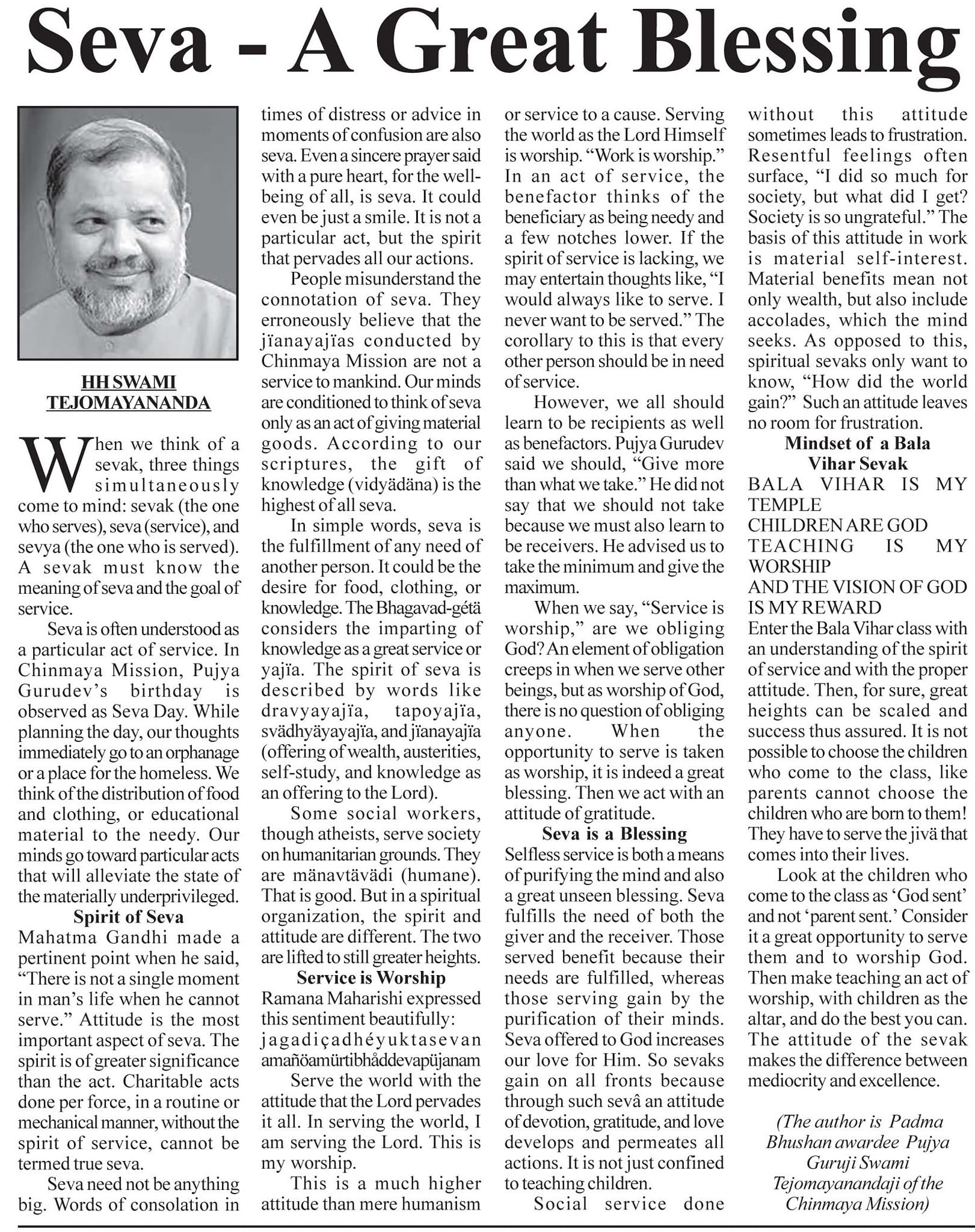By: H.H.Swami Tejomayananda
Published in the Sikkim Express, on June 9th, 2023.
When we think of a sevak, three things simultaneously come to mind: sevak (the one who serves), seva (service), and sevya (the one who is served). A sevak must know the meaning of seva and the goal of service.
Seva is often understood as a particular act of service. In Chinmaya Mission, Pujya Gurudev’s birthday is observed as Seva Day. While planning the day, our thoughts immediately go to an orphanage or a place for the homeless. We think of the distribution of food and clothing, or educational material to the needy. Our minds go toward particular acts that will alleviate the state of the materially underprivileged.
Spirit of Seva
Mahatma Gandhi made a pertinent point when he said, ”There is not a single moment in man’s life when he cannot serve.” Attitude is the most important aspect of seva. The spirit is of greater significance than the act. Charitable acts done per force, in a routine or mechanical manner, without the spirit of service, cannot be termed true seva.
Seva need not be anything big. Words of consolation in times of distress or advice in moments of confusion are also seva. Even a sincere prayer said with a pure heart, for the well-being of all, is seva. It could even be just a smile. It is not a particular act, but the spirit that pervades all our actions.
People misunderstand the connotation of seva. They erroneously believe that the Jnana Yagnas conducted by Chinmaya Mission are not a service to mankind. Our minds are conditioned to think of seva only as an act of giving material goods. According to our scriptures, the gift of knowledge (Vidyadana) is the highest of all seva.
In simple words, seva is the fulfillment of any need of another person. It could be the desire for food, clothing, or knowledge. The Bhagavad-Gita considers the imparting of knowledge as a great service or yagna. The spirit of seva is described by words like Drvya yagna, Tapo yagna, Svadhya yagna, and Jnana yagna (offering of wealth, austerities, self-study, and knowledge as an offering to the Lord).
Some social workers, though atheists, serve society on humanitarian grounds. They are Manavta Vadi (humane). That is good. But in a spiritual organization, the spirit and attitude are different. The two are lifted to still greater heights.
Service is Worship
Ramana Maharishi expressed this sentiment beautifully:
जगत ईशधी युक्तसेवनम् ।
अष्टमूर्तिभृद्देवपूजनम् ॥
Serve the world with the attitude that the Lord pervades it all. In serving the world, I am serving the Lord. This is my worship.
This is a much higher attitude than mere humanism or service to a cause. Serving the world as the Lord Himself is worship. “Work is worship.” In an act of service, the benefactor thinks of the beneficiary as being needy and a few notches lower. If the spirit of service is lacking, we may entertain thoughts like, “I would always like to serve. I never want to be served.” The corollary to this is that every other person should be in need of service.
However, we all should learn to be recipients as well as benefactors. Pujya Gurudev said we should, “Give more than what we take.” He did not say that we should not take because we must also learn to be receivers. He advised us to take the minimum and give the maximum.
When we say, “Service is worship,” are we obliging God? An element of obligation creeps in when we serve other beings, but as worship of God, there is no question of obliging anyone. When the opportunity to serve is taken as worship, it is indeed a great blessing. Then we act with an attitude of gratitude.
Seva is a Blessing
Selfless service is both a means of purifying the mind and also a great unseen blessing. Seva fulfills the need of both the giver and the receiver. Those served benefit because their needs are fulfilled, whereas those serving gain by the purification of their minds. Seva offered to God increases our love for Him. So sevaks gain on all fronts because through such seva an attitude of devotion, gratitude, and love develops and permeates all actions. It is not just confined to teaching children.
Social service done without this attitude sometimes leads to frustration. Resentful feelings often surface, “I did so much for society, but what did I get? Society is so ungrateful.” The basis of this attitude in work is material self-interest. Material benefits mean not only wealth, but also include accolades, which the mind seeks. As opposed to this, spiritual sevaks only want to know, “How did the world gain?” Such an attitude leaves no room for frustration.
Mindset of a Bala Vihar Sevak
BALA VIHAR IS MY TEMPLE, CHILDREN ARE GOD. TEACHING IS MY WORSHIP AND THE VISION OF GOD IS MY REWARD
Enter the Bala Vihar class with an understanding of the spirit of service and with the proper attitude. Then, for sure, great heights can be scaled and success thus assured. It is not possible to choose the children who come to the class, like parents cannot choose the children who are born to them! They have to serve the Jiva that comes into their lives.
Look at the children who come to the class as ‘God sent’ and not ‘parent sent.’ Consider it a great opportunity to serve them and to worship God. Then make teaching an act of worship, with children as the altar, and do the best you can.
The attitude of the sevak makes the difference between mediocrity and excellence.
(Author, Padma Bhushan Pujya Guruji Swami Tejomayanandaji belongs to Chinmaya Mission)



